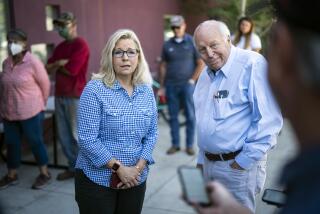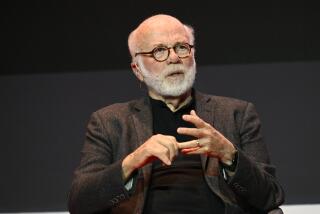Cheney’s Standard of Living Soars in Private Sector
- Share via
WASHINGTON — The private sector--what George W. Bush calls the engine fueling the nation’s new wealth--has been very good to running mate Dick Cheney.
Cheney spent much of his adult life as a public servant, collecting a relatively modest government salary as presidential aide, congressman and Defense secretary from the early 1970s to the early 1990s.
Back in his days as a U.S. congressman from Wyoming in the 1980s, he even resorted to lunching every few months with old friends and colleagues at his former East Coast investment firm to supplement his income. He collected up to $2,000 a pop in honorariums for hobnobbing over sandwiches, an unusual practice that raised eyebrows among good-government groups.
But by the time Cheney returned to the private sector in 1993, lunch was no longer a problem. As head of Halliburton Co., a Dallas-based energy services giant, Cheney entered the elite of the nation’s well-heeled CEOs. He left the company this summer with an early-retirement stock package worth nearly $34 million.
From 1992, his last year as Defense secretary, to 1999, his last full year as head of Halliburton, Cheney saw his reported annual income skyrocket nearly twenty-fold--from $258,000 to $4.42 million, according to tax returns and disclosure statements.
Cheney has won generally high marks for his stewardship of Halliburton at a time of global expansion for the firm, and he speaks proudly of his private-sector success.
That was clear during the Oct. 5 vice presidential debate, when Democrat Joseph I. Lieberman said that Cheney certainly seemed better off than he was eight years ago. Cheney’s response: “I can tell you, Joe, that the government had absolutely nothing to do with it.”
But Cheney’s new standard of living has not helped him during the campaign. On the trail, he has had to answer repeated questions about the money he has made in recent years.
For weeks, he adamantly rejected calls to forfeit more than $3 million in unexercised stock options if he is elected vice president. But under pressure, he announced in September that he would forego the options “to avoid even the appearance of a conflict of interest.”
Less than two weeks later, Cheney reaped $18.5 million in profits by exercising options and selling common stock in Halliburton.
He also has been criticized for financial reports showing that he and his wife donated less than 1% of their income to charity in the last 10 years. But Cheney said that if matching funds from employers and speaking fees he donated (because government ethics rules prohibited their acceptance) were factored in, the total of his contributions would more than double.
“I think that’s a choice that individuals have to make in terms of what they want to do with their resources,” Cheney said.
During his tenure at Halliburton, which began in 1995, Cheney and the company profited from Halliburton’s tremendous expansion overseas in government-related programs.
A report by the Washington-based Center for Public Integrity suggested that Halliburton essentially cashed in--doubling the value of its government contracts--on Cheney’s prominence as a former Pentagon secretary. The company took in revenue of $2.3 billion on government contracts in military hot-spots such as Kosovo and Bosnia.
But Halliburton executives, government contractors and even the firm’s competitors insist that the firm’s growth had more to do with expanding global needs than anything else.
Cheney’s presence may have helped to “open doors for us,” said Larry Pope, president of Halliburton subsidiary Brown & Root Services, but Cheney did not play an active role in government contracting, and his priority was that executives “followed the rules very, very closely and to the letter.”
Cheney, for his part, said he never approached the Pentagon about Halliburton contracts.
“All those contracts were competitively bid,” he told a reporter recently, “and I didn’t participate directly in any of that process because I didn’t want anyone to criticize me for going back trying to use my past positions in order to obtain favorable treatment.”
*
Times staff writers Megan Garvey and Paul Richter contributed to this story.
More to Read
Get the L.A. Times Politics newsletter
Deeply reported insights into legislation, politics and policy from Sacramento, Washington and beyond. In your inbox twice per week.
You may occasionally receive promotional content from the Los Angeles Times.










